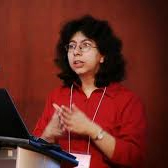AI 2014
27th Canadian Conference on Artificial Intelligence
May 6-9, 2014, Montréal, Québec, Canada
Invited Tutorials
AI 2014 will include a technical program consisting of presentations of research papers, invited speakers, and tutorials describing the state-of-the-art in artificial intelligence. A Graduate Student Symposium will occur on the first day of the conference. AI 2014 will feature the following distinguished tutorial speakers.

Yoshua Bengio
Deep Learning of Representations
Deep learning methods have been extremely successful recently, in particular in the areas of speech recognition, object recognition and language modeling. Deep representations are representations at multiple levels of abstraction, of increasing non-linearity. The success of machine learning algorithms generally depends on data representation, and we hypothesize that this is because different representations can entangle and hide more or less the different explanatory factors of variation behind the data. Although specific domain knowledge can be used to help design representations, learning with generic priors can also be used, and the quest for AI is motivating the design of more powerful representation-learning algorithms implementing such priors. This talk introduces basic concepts in representation learning, distributed representations, and deep learning, both supervised and unsupervised.
Yoshua Bengio is a Full Professor in the Department of Computer Science and Operations Research at Université de Montréal, head of the Machine Learning Laboratory (LISA), CIFAR Fellow in the Neural Computation and Adaptive Perception program, Canada Research Chair in Statistical Learning Algorithms, and he also holds the NSERC-Ubisoft industrial chair. His main research ambition is to understand principles of learning that yield intelligence. He teaches a graduate course in Machine Learning and supervises a large group of graduate students and post-docs. His research is widely cited (over 10300 citations found by Google Scholar in 2012, with an H-index of 45). Yoshua is currently action editor for the Journal of Machine Learning Research, editor for Foundations and Trends in Machine Learning, and has been associate editor for the Machine Learning Journal and the IEEE Transactions on Neural Networks. He has also been very active in conference organization including Program Chair for NIPS'2008, General Chair for NIPS'2009, co-organizer (with Yann Le Cun) of the Learning Workshop, and co-founder (also with Yann Le Cun) of the International Conference on Representation Learning.

Doina Precup
Artificial Intelligence Applications in Clinical Monitoring
Health care has traditionally been one of the early adopters of artificial intelligence and machine learning technologies. AI methods have been used extensively in patient diagnosis, medical image analysis, disease outbreak detection and assistive technologies. However, most of the clinical monitoring, especially in emergency situations, is performed by physicians and nurses. In the last 10-15 years, however, clinical monitoring has also started to embrace the use of AI techniques, due to the fact that the sensing capabilities have improved, providing a flood of different signals which are more difficult to analyze by people and increase the variability in clinical decisions. Moreover, hospital crowding makes it harder for nurses and doctors to monitor patients continuously. This tutorial will describe AI approaches for bed-side clinical monitoring, with examples from labor monitoring and monitoring of cardio-respiratory patterns. The goal in these applications is to accurately predict an unfavourable clinical situation early enough that a clinical intervention can be enacted. An emerging theme will be the interplay and complementarity of AI methods and state-of-art signal processing.
Dr. Doina Precup is an Associate Professor in the School of Computer Science of McGill University. She earned her B.Sc. degree from the Technical University Cluj-Napoca, Romania (1994) and her M.Sc. (1997) and Ph.D. (2000) degrees from the University of Massachusetts Amherst, where she was a Fulbright fellow. Her research interests lie in the area of machine learning, with an emphasis on reinforcement learning and time series data, as well as applications of machine learning and artificial intelligence to activity recognition, medicine, electronic commerce and robotics. She currently serves as chair of the NSERC Discovery Evaluation Group for Computer Science.